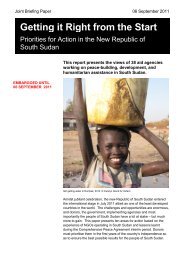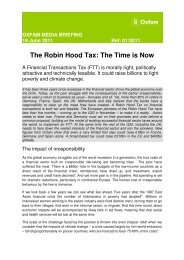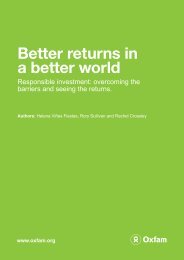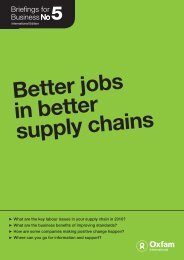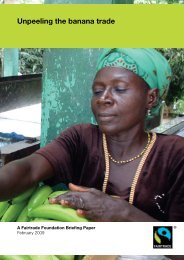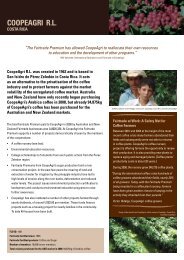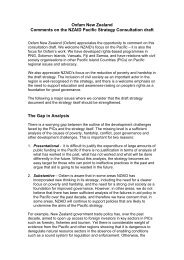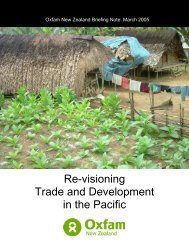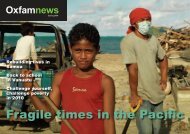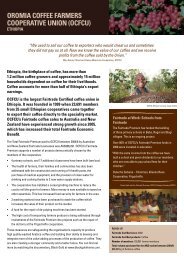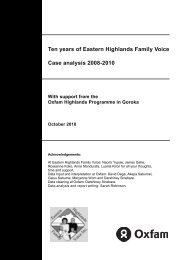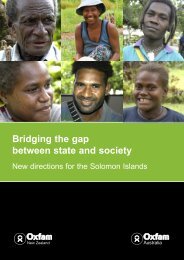3. Regulate commodity speculationA precautionary approach to speculation in foodcommodities is needed. Governments can curbexcessive speculation while still enabling the legitimaterisk-mitigation and price-discovery role of futuresmarkets. Options include requiring increasedtransparency to allow regulators to monitor speculatorsand limit their activities if necessary. Price limits canreduce short-term volatility, and position limits canprevent excessive bets on price movements. Limits couldbe set initially at modest levels and gradually tightened,allowing regulators to monitor for any adverseconsequences such as poor liquidity.Following on progress in the USA, proposals to regulatetrading in commodity derivatives are on the agenda ofthe G20 in 2011, as well as the EU.4. Operationalize and capitalize a new globalclimate fundAdaptation is an urgent priority in developing countries,but the resources needed – <strong>Oxfam</strong> estimates $100bn ayear by 2020 – are scant. Moreover, the institutionalframework for delivering climate finance is a spaghettibowl of multilateral and bilateral channels, massivelyincreasing transaction costs for developing countriestrying to access the meagre funds available. This has tochange – the new global climate fund agreed at theinternational climate talks in Cancun in 2010 must be upand running as soon as possible. Agreement on a set ofinnovative mechanisms to raise money for the fund, suchas a financial transactions tax or levies on internationalaviation and shipping, remains a critical priority and is onthe agenda of the G20 in 2011.National approachesIn addition to investing in agriculture, nationalgovernments can do much to build resilience andreduce vulnerability.1. Invest in climate change adaptationPerhaps the most urgent task for national governmentsis to help communities adapt to climate change byreducing vulnerability and climate-proofinginfrastructure. As a priority, developing countrygovernments must map vulnerability and developnational adaptation plans that prioritize the mostvulnerable people. These efforts must be matched bysupport from the international community – in the formof new and additional public finance.Box 9: Successful adaptation to climate changein ThailandIn 2007 farmers in Yasothorn Province, north-eastThailand, experienced the longest dry spell duringa rainy season in decades. Yasothorn, one of theten poorest provinces in the country, is part of the‘Weeping Plain’, named for its barren landscape.The plain’s dry conditions have made it suitable forgrowing fragrant jasmine rice.The drought was part of a trend. Rainfall records showrains arriving later and later each year, caused at leastin part by climate change. Working with localorganization Earth Net Foundation (ENF), <strong>Oxfam</strong>initiated a pilot climate change adaptation projectinvolving 57 men and women from the 509 organicfarming households in the province.Participants received full information on the state ofclimate change in Yasothorn, and shared ideas abouthow to adapt. They then designed their own on-farmwater management systems, including storage ponds,wells, ditches, sprinkler systems, and pumps – andbuilt them with help from a small ENF loan fund. Thefarmers also grew vegetables and planted fruit trees.The following year, Yasothorn was again hit bydrought – the ‘worst in 57 years’, according to onevillage elder. Excessive rainfall then drowned much ofthe remaining crops at harvest time. The projectfarms’ overall rice production fell by almost 16 per cent– but things were worse on non-participating farms,where production fell by 40 per cent overall.Source: <strong>Oxfam</strong> research‘Case Study: Jasmine Rice in the Weeping Plain’www.oxfam.org.uk/resources48Left: A windmill pumps water to a storage tank to supplyManoon Phupa’s farm. In 2007 farmers in YasothornProvince, north-east Thailand, experienced the longestdry spell in decades. <strong>Oxfam</strong> has worked with localorganization Earth Net Foundation since 2004, topromote organic agricultural production and fair-trademarketing with farmers. (Thailand, 2010)
2. Expand social protectionAt the height of the 2008 food price spike, manydeveloping country governments – faced with spirallinghunger and discontent – reached for policy options thatonly made the problem worse. Forty-six developingcountries used economy-wide subsidies or price controlsto try to contain food prices – responses that can reducethe incentives for food producers to increase output, orplace crippling burdens on government budgets. 128Social protection programmes tailored to the specificnational context can target resources to the mostvulnerable people, which are likely to include women andrural producers more generally. In the most sophisticatedcases, like Brazil’s very successful Fome Zero (ZeroHunger) programme, different approaches are blendedinto a massive across-the-board push to reduce hunger.Ultimately, governments should aim to establishuniversal programmes, which tend to be more efficientand by definition protect more people.Today only 20 per cent of the world’s people enjoyaccess to social protection of any kind – a scandalousgap, yet an improvement upon the situation only a fewyears ago, largely due to the expansion of provision inChina and Brazil. 129 Even in these cases, the measuresoften lack permanence. The big gaps are in low-incomecountries, where social protection tends to be donor-ledpilot programmes rather than nationally ownedapproaches.Predictable funding from aid donors, in the form of directbudgetary support, would allow governments toimplement national programmes. Technical support mayalso be necessary but, critically, approaches must fitspecific national circumstances, as there are fewoff-the-shelf solutions.Without leadership from within government, no amountof donor support will deliver effective social protection.All too often, politicians shy away from ambitiousprogrammes for fear of long-term fiscal commitments(ignoring the broader economic benefits that will bedelivered) or worry that they will simply createdependency (which is not supported by the evidence). 130A shared goal, for governments and internationalinstitutions, should be universal access to a basic levelof social protection sufficient to realise fundamentaleconomic and social rights, including the right to food.The UN Social Protection Floor Initiative 131 provides aperfect platform around which to coalesce.‘The crèche has been a huge benefit tothe people of this community. It allowswomen to look for part-time work and isproviding a really good start to theirchildren’s education. The children alsoget free, nutritious meals, which is agodsend for parents who areunemployed and who struggle toprovide regular meals for their family.’Eline Carla Machado, Head of the Vila IrmaDulce Crèche, BrazilAbove: Roni, Marta, and Denilson eating their free lunchat the Vila Irma Dulce Creche, Brazil. The communitylobbied for the school, the teachers, and the free lunchesfor the children. (Brazil, 2004)<strong>Growing</strong> a <strong>Better</strong> <strong>Future</strong>Chapter 3: The new prosperity49



